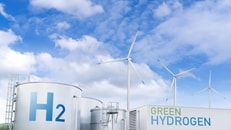Nippon Gases: Using biogas to drive the Net Zero transition
Biogas is rapidly becoming a key player in the ongoing global transition to renewable energy. As the world continues to move away from fossil fuels, the gas is emerging as a reliable, sustainable and cost-effective alternative.
Produced through the anaerobic digestion (AD) of organic matter such as agricultural waste, sewage sludge and food scraps, biogas is generated when microorganisms break down the organic matter and release a mixture of gases, primarily methane and carbon dioxide (CO2).
One of its key benefits is its ability to reduce greenhouse gas emissions. By capturing the methane released during AD and using it as a fuel, biogas projects can significantly reduce emissions to help combat global warming.
The versatility of biogas also lends itself to applications such as electricity generation, for heating power plants, fuelling vehicles and even being injected into natural gas pipelines.
... to continue reading you must be subscribed
























